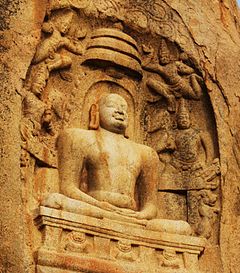Mahavir Jayanti
| Mahavir Janma Kalyanak | |
|---|---|

Vardhaman Mahavira image at Keezhakuyilkudi, Madurai, Tamilnadu, India.
|
|
| Also called | Translation: Birth Anniversary of Mahavira; Mahavir Janma Kalyanak |
| Observed by | Jains |
| Type | Religious, India (National holiday) |
| Significance | Birth Anniversary of Mahavira |
| Celebrations | Going to the Jain Temple |
| Observances | Prayers, religious rituals |
| Date | Chaitra Sud Triyodashi (Vira Nirvana Samvat) |
| 2016 date | 19 April |
| 2017 date | 9 April |
| Frequency | annual |
Mahavir Janma Kalyanak, also known as Mahavir Jayanti, is the most important religious festival for Jains. It celebrates the birth of Mahavira, twenty-fourth and the last Tirthankara (Teaching God) of Avasarpiṇī. On the Gregorian calendar, the holiday occurs either in March or April.
Most modern historians consider Vasokund as Mahavira's birthplace. According to Jain texts, Mahavira was born on the thirteenth day of the bright half of the moon in the month of Chaitra in the year 599 BCE (Chaitra Sud 13). Mahavira was born in a democratic kingdom (Ganarajya), Vajji, where the king was chosen by votes. Vaishali was its capital.
As a child, Mahavira was called with the name 'Vardhamana', which means "One who grows", because of the increased prosperity in the kingdom at the time of his birth. In Vasokund, Mahavira is much revered by the villagers. A place called Ahalya bhumi has not been ploughed for hundreds of years by the family that owns it, as it is considered to be the birthplace of Mahavira.
Mahavira was born into Ikshvaku dynasty as the son of King Siddhartha of Kundagrama and Queen Trishala. During her pregnancy, Trishala was believed to have had a number of auspicious dreams, all signifying the coming of a great soul. Digambara sect of Jainism holds that the mother saw 16 dreams which were interpreted by the King Siddhartha. According to the Svetambaras the total number of auspicious dreams is fourteen. It is said that when Queen Trishala gave birth to Mahavira, Indra, the head of heavenly beings (devas) performed a ritual called abhisheka, this being the second of five auspicious events (Panch Kalyanakas), said to occur in the life of all Tirthankaras.
...
Wikipedia
